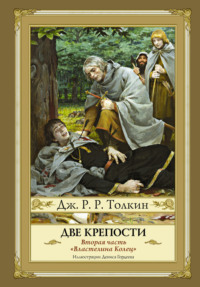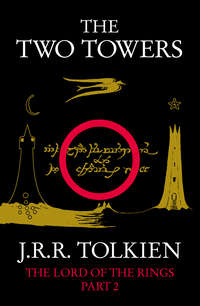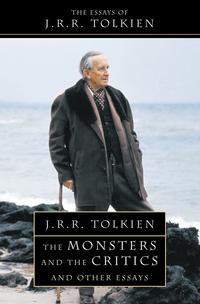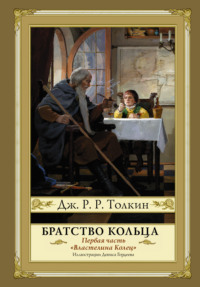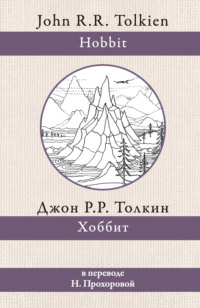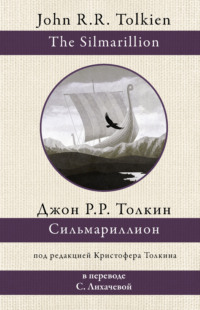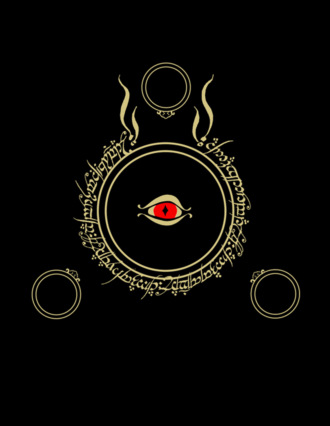
Полная версия
The Lord of the Rings: The Fellowship of the Ring, The Two Towers, The Return of the King
‘I was thinking so,’ said Frodo. ‘But we have got to try and get there; and it won’t be done by sitting and thinking. So I am afraid we must be going. Thank you very much indeed for your kindness! I’ve been in terror of you and your dogs for over thirty years, Farmer Maggot, though you may laugh to hear it. It’s a pity: for I’ve missed a good friend. And now I’m sorry to leave so soon. But I’ll come back, perhaps, one day – if I get a chance.’
‘You’ll be welcome when you come,’ said Maggot. ‘But now I’ve a notion. It’s near sundown already, and we are going to have our supper; for we mostly go to bed soon after the Sun. If you and Mr. Peregrin and all could stay and have a bite with us, we would be pleased!’
‘And so should we!’ said Frodo. ‘But we must be going at once, I’m afraid. Even now it will be dark before we can reach the Ferry.’
‘Ah! but wait a minute! I was going to say: after a bit of supper, I’ll get out a small waggon, and I’ll drive you all to the Ferry. That will save you a good step, and it might also save you trouble of another sort.’
Frodo now accepted the invitation gratefully, to the relief of Pippin and Sam. The sun was already behind the western hills, and the light was failing. Two of Maggot’s sons and his three daughters came in, and a generous supper was laid on the large table. The kitchen was lit with candles and the fire was mended. Mrs. Maggot bustled in and out. One or two other hobbits belonging to the farm-household came in. In a short while fourteen sat down to eat. There was beer in plenty, and a mighty dish of mushrooms and bacon, besides much other solid farmhouse fare. The dogs lay by the fire and gnawed rinds and cracked bones.
When they had finished, the farmer and his sons went out with a lantern and got the waggon ready. It was dark in the yard, when the guests came out. They threw their packs on board and climbed in. The farmer sat in the driving-seat, and whipped up his two stout ponies. His wife stood in the light of the open door.
‘You be careful of yourself, Maggot!’ she called. ‘Don’t go arguing with any foreigners, and come straight back!’
‘I will!’ said he, and drove out of the gate. There was now no breath of wind stirring; the night was still and quiet, and a chill was in the air. They went without lights and took it slowly. After a mile or two the lane came to an end, crossing a deep dike, and climbing a short slope up on to the high-banked causeway.
Maggot got down and took a good look either way, north and south, but nothing could be seen in the darkness, and there was not a sound in the still air. Thin strands of river-mist were hanging above the dikes, and crawling over the fields.
‘It’s going to be thick,’ said Maggot; ‘but I’ll not light my lanterns till I turn for home. We’ll hear anything on the road long before we meet it tonight.’
It was five miles or more from Maggot’s lane to the Ferry. The hobbits wrapped themselves up, but their ears were strained for any sound above the creak of the wheels and the slow clop of the ponies’ hoofs. The waggon seemed slower than a snail to Frodo. Beside him Pippin was nodding towards sleep; but Sam was staring forwards into the rising fog.
They reached the entrance to the Ferry lane at last. It was marked by two tall white posts that suddenly loomed up on their right. Farmer Maggot drew in his ponies and the waggon creaked to a halt. They were just beginning to scramble out, when suddenly they heard what they had all been dreading: hoofs on the road ahead. The sound was coming towards them.
Maggot jumped down and stood holding the ponies’ heads, and peering forward into the gloom. Clip-clop, clip-clop came the approaching rider. The fall of the hoofs sounded loud in the still, foggy air.
‘You’d better be hidden, Mr. Frodo,’ said Sam anxiously. ‘You get down in the waggon and cover up with blankets, and we’ll send this rider to the rightabouts!’ He climbed out and went to the farmer’s side. Black Riders would have to ride over him to get near the waggon.
Clop-clop, clop-clop. The rider was nearly on them.
‘Hallo there!’ called Farmer Maggot. The advancing hoofs stopped short. They thought they could dimly guess a dark cloaked shape in the mist, a yard or two ahead.
‘Now then!’ said the farmer, throwing the reins to Sam and striding forward. ‘Don’t you come a step nearer! What do you want, and where are you going?’
‘I want Mr. Baggins. Have you seen him?’ said a muffled voice – but the voice was the voice of Merry Brandybuck. A dark lantern was uncovered, and its light fell on the astonished face of the farmer.
‘Mr. Merry!’ he cried.
‘Yes, of course! Who did you think it was?’ said Merry coming forward. As he came out of the mist and their fears subsided, he seemed suddenly to diminish to ordinary hobbit-size. He was riding a pony, and a scarf was swathed round his neck and over his chin to keep out the fog.
Frodo sprang out of the waggon to greet him. ‘So there you are at last!’ said Merry. ‘I was beginning to wonder if you would turn up at all today, and I was just going back to supper. When it grew foggy I came across and rode up towards Stock to see if you had fallen in any ditches. But I’m blest if I know which way you have come. Where did you find them, Mr. Maggot? In your duck-pond?’
‘No, I caught ’em trespassing,’ said the farmer, ‘and nearly set my dogs on ’em; but they’ll tell you all the story, I’ve no doubt. Now, if you’ll excuse me, Mr. Merry and Mr. Frodo and all, I’d best be turning for home. Mrs. Maggot will be worriting with the night getting thick.’
He backed the waggon into the lane and turned it. ‘Well, good night to you all,’ he said. ‘It’s been a queer day, and no mistake. But all’s well as ends well; though perhaps we should not say that until we reach our own doors. I’ll not deny that I’ll be glad now when I do.’ He lit his lanterns, and got up. Suddenly he produced a large basket from under the seat. ‘I was nearly forgetting,’ he said. ‘Mrs. Maggot put this up for Mr. Baggins, with her compliments.’ He handed it down and moved off, followed by a chorus of thanks and good-nights.
They watched the pale rings of light round his lanterns as they dwindled into the foggy night. Suddenly Frodo laughed: from the covered basket he held, the scent of mushrooms was rising.
Chapter 5 A CONSPIRACY UNMASKED
‘Now we had better get home ourselves,’ said Merry. ‘There’s something funny about all this, I see; but it must wait till we get in.’
They turned down the Ferry lane, which was straight and well-kept and edged with large white-washed stones. In a hundred yards or so it brought them to the river-bank, where there was a broad wooden landing-stage. A large flat ferry-boat was moored beside it. The white bollards near the water’s edge glimmered in the light of two lamps on high posts. Behind them the mists in the flat fields were now above the hedges; but the water before them was dark, with only a few curling wisps like steam among the reeds by the bank. There seemed to be less fog on the further side.
Merry led the pony over a gangway on to the ferry, and the others followed. Merry then pushed slowly off with a long pole. The Brandywine flowed slow and broad before them. On the other side the bank was steep, and up it a winding path climbed from the further landing. Lamps were twinkling there. Behind loomed up the Buck Hill; and out of it, through stray shrouds of mist, shone many round windows, yellow and red. They were the windows of Brandy Hall, the ancient home of the Brandybucks.
Long ago Gorhendad Oldbuck, head of the Oldbuck family, one of the oldest in the Marish or indeed in the Shire, had crossed the river, which was the original boundary of the land eastwards. He built (and excavated) Brandy Hall, changed his name to Brandybuck, and settled down to become master of what was virtually a small independent country. His family grew and grew, and after his days continued to grow, until Brandy Hall occupied the whole of the low hill, and had three large front-doors, many side-doors, and about a hundred windows. The Brandybucks and their numerous dependants then began to burrow, and later to build, all round about. That was the origin of Buckland, a thickly inhabited strip between the river and the Old Forest, a sort of colony from the Shire. Its chief village was Bucklebury, clustering in the banks and slopes behind Brandy Hall.
The people in the Marish were friendly with the Bucklanders, and the authority of the Master of the Hall (as the head of the Brandybuck family was called) was still acknowledged by the farmers between Stock and Rushey. But most of the folk of the old Shire regarded the Bucklanders as peculiar, half foreigners as it were. Though, as a matter of fact, they were not very different from the other hobbits of the Four Farthings. Except in one point: they were fond of boats, and some of them could swim.
Their land was originally unprotected from the East; but on that side they had built a hedge: the High Hay. It had been planted many generations ago, and was now thick and tall, for it was constantly tended. It ran all the way from Brandywine Bridge, in a big loop curving away from the river, to Haysend (where the Withywindle flowed out of the Forest into the Brandywine): well over twenty miles from end to end. But, of course, it was not a complete protection. The Forest drew close to the hedge in many places. The Bucklanders kept their doors locked after dark, and that also was not usual in the Shire.
The ferry-boat moved slowly across the water. The Buckland shore drew nearer. Sam was the only member of the party who had not been over the river before. He had a strange feeling as the slow gurgling stream slipped by: his old life lay behind in the mists, dark adventure lay in front. He scratched his head, and for a moment had a passing wish that Mr. Frodo could have gone on living quietly at Bag End.
The four hobbits stepped off the ferry. Merry was tying it up, and Pippin was already leading the pony up the path, when Sam (who had been looking back, as if to take farewell of the Shire) said in a hoarse whisper:
‘Look back, Mr. Frodo! Do you see anything?’
On the far stage, under the distant lamps, they could just make out a figure: it looked like a dark black bundle left behind. But as they looked it seemed to move and sway this way and that, as if searching the ground. It then crawled, or went crouching, back into the gloom beyond the lamps.
‘What in the Shire is that?’ exclaimed Merry.
‘Something that is following us,’ said Frodo. ‘But don’t ask any more now! Let’s get away at once!’ They hurried up the path to the top of the bank, but when they looked back the far shore was shrouded in mist, and nothing could be seen.
‘Thank goodness you don’t keep any boats on the west-bank!’ said Frodo. ‘Can horses cross the river?’
‘They can go ten miles north to Brandywine Bridge – or they might swim,’ answered Merry. ‘Though I never heard of any horse swimming the Brandywine. But what have horses to do with it?’
‘I’ll tell you later. Let’s get indoors and then we can talk.’
‘All right! You and Pippin know your way; so I’ll just ride on and tell Fatty Bolger that you are coming. We’ll see about supper and things.’
‘We had our supper early with Farmer Maggot,’ said Frodo; ‘but we could do with another.’
‘You shall have it! Give me that basket!’ said Merry, and rode ahead into the darkness.
It was some distance from the Brandywine to Frodo’s new house at Crickhollow. They passed Buck Hill and Brandy Hall on their left, and on the outskirts of Bucklebury struck the main road of Buckland that ran south from the Bridge. Half a mile northward along this they came to a lane opening on their right. This they followed for a couple of miles as it climbed up and down into the country.
At last they came to a narrow gate in a thick hedge. Nothing could be seen of the house in the dark: it stood back from the lane in the middle of a wide circle of lawn surrounded by a belt of low trees inside the outer hedge. Frodo had chosen it, because it stood in an out-of-the-way corner of the country, and there were no other dwellings close by. You could get in and out without being noticed. It had been built a long while before by the Brandybucks, for the use of guests, or members of the family that wished to escape from the crowded life of Brandy Hall for a time. It was an old-fashioned countrified house, as much like a hobbit-hole as possible: it was long and low, with no upper storey; and it had a roof of turf, round windows, and a large round door.
As they walked up the green path from the gate no light was visible; the windows were dark and shuttered. Frodo knocked on the door, and Fatty Bolger opened it. A friendly light streamed out. They slipped in quickly and shut themselves and the light inside. They were in a wide hall with doors on either side; in front of them a passage ran back down the middle of the house.
‘Well, what do you think of it?’ asked Merry coming up the passage. ‘We have done our best in a short time to make it look like home. After all Fatty and I only got here with the last cart-load yesterday.’
Frodo looked round. It did look like home. Many of his own favourite things – or Bilbo’s things (they reminded him sharply of him in their new setting) – were arranged as nearly as possible as they had been at Bag End. It was a pleasant, comfortable, welcoming place; and he found himself wishing that he was really coming here to settle down in quiet retirement. It seemed unfair to have put his friends to all this trouble; and he wondered again how he was going to break the news to them that he must leave them so soon, indeed at once. Yet that would have to be done that very night, before they all went to bed.
‘It’s delightful!’ he said with an effort. ‘I hardly feel that I have moved at all.’
The travellers hung up their cloaks, and piled their packs on the floor. Merry led them down the passage and threw open a door at the far end. Firelight came out, and a puff of steam.
‘A bath!’ cried Pippin. ‘O blessed Meriadoc!’
‘Which order shall we go in?’ said Frodo. ‘Eldest first, or quickest first? You’ll be last either way, Master Peregrin.’
‘Trust me to arrange things better than that!’ said Merry. ‘We can’t begin life at Crickhollow with a quarrel over baths. In that room there are three tubs, and a copper full of boiling water. There are also towels, mats and soap. Get inside, and be quick!’
Merry and Fatty went into the kitchen on the other side of the passage, and busied themselves with the final preparations for a late supper. Snatches of competing songs came from the bathroom mixed with the sound of splashing and wallowing. The voice of Pippin was suddenly lifted up above the others in one of Bilbo’s favourite bath-songs.
Sing hey! for the bath at close of day
that washes the weary mud away!
A loon is he that will not sing:
O! Water Hot is a noble thing!
O! Sweet is the sound of falling rain,
and the brook that leaps from hill to plain;
but better than rain or rippling streams
is Water Hot that smokes and steams.
O! Water cold we may pour at need
down a thirsty throat and be glad indeed;
but better is Beer, if drink we lack,
and Water Hot poured down the back.
O! Water is fair that leaps on high
in a fountain white beneath the sky;
but never did fountain sound so sweet
as splashing Hot Water with my feet!
There was a terrific splash, and a shout of Whoa! from Frodo. It appeared that a lot of Pippin’s bath had imitated a fountain and leaped on high.
Merry went to the door: ‘What about supper and beer in the throat?’ he called. Frodo came out drying his hair.
‘There’s so much water in the air that I’m coming into the kitchen to finish,’ he said.
‘Lawks!’ said Merry, looking in. The stone floor was swimming. ‘You ought to mop all that up before you get anything to eat, Peregrin,’ he said. ‘Hurry up, or we shan’t wait for you.’
Конец ознакомительного фрагмента.
Текст предоставлен ООО «ЛитРес».
Прочитайте эту книгу целиком, купив полную легальную версию на ЛитРес.
Безопасно оплатить книгу можно банковской картой Visa, MasterCard, Maestro, со счета мобильного телефона, с платежного терминала, в салоне МТС или Связной, через PayPal, WebMoney, Яндекс.Деньги, QIWI Кошелек, бонусными картами или другим удобным Вам способом.
Примечания
1
As the records of Gondor relate this was Argeleb II, the twentieth of the Northern line, which came to an end with Arvedui three hundred years later.
2
Thus, the years of the Third Age in the reckoning of the Elves and the Dûnedain can be found by adding 1600 to the dates of Shire-reckoning.
3
See Appendix B: annals 1451, 1462, 1482; and note at end of Appendix C.
4
Represented in much reduced form in Appendix B as far as the end of the Third Age.


